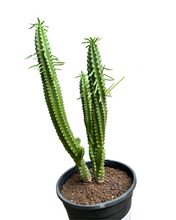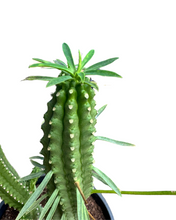This plant is often labelled as Euphorbia loricata but it is actually a threeway hybrid called Macguffin; a cross of E. bupleurifolia and E. clava, then crossed with E. heptagona. It is thought to be a complex garden hybrid raised by Robert Manda from the 1940’s. It was named ‘Macguffin’ by Gordon Rowley in 1997; 'Macguffin' is the name Alfred Hitchcock gave to the plot device in his movies.
Euphorbia cv. Macguffin has erect stems which tend to group at the base as the plant matures, they have tuberculate green veins, from which the slim lanceolate leaves emerge. The cyathium are yellow-green and at the end of a long peduncle. Leaves tend to drop off as the plant grows.
Light: Allow the plant to see the sun for as many hours of the day as possible; Euphorbia require direct light to grow well.
Water: Allow the potting mix to dry out completely in between waterings; Euphorbia store the water they need for photosynthesis inside their stems. Before watering, aerate the potting mix with a few pokes of a skewer or blunt stick, pour water slowly over the top of the substrate and allow the water to pass through the drainage holes.
Potting mix: A mix of predominantly non-organic material like clay, pumice or lava grit with a small amount of coco coir. The mix this plant is already potted in is ideal. Euphorbia only need repotting every 2-3 years.
Fertilising: Feed every few waterings during the growing season. You can dilute fertiliser to half the recommended amount but never add more.
Temperature: 18-26˚C. They can tolerate short periods of between 8 and 12˚C.
Humidity: Average humidity; if the humidity is particularly high, good ventilation is key to prevent mildew and fungal disease.
Euphorbia are toxic and contain a milky sap which can cause severe skin irritation & eye pain, keep out of reach of pets and children.


